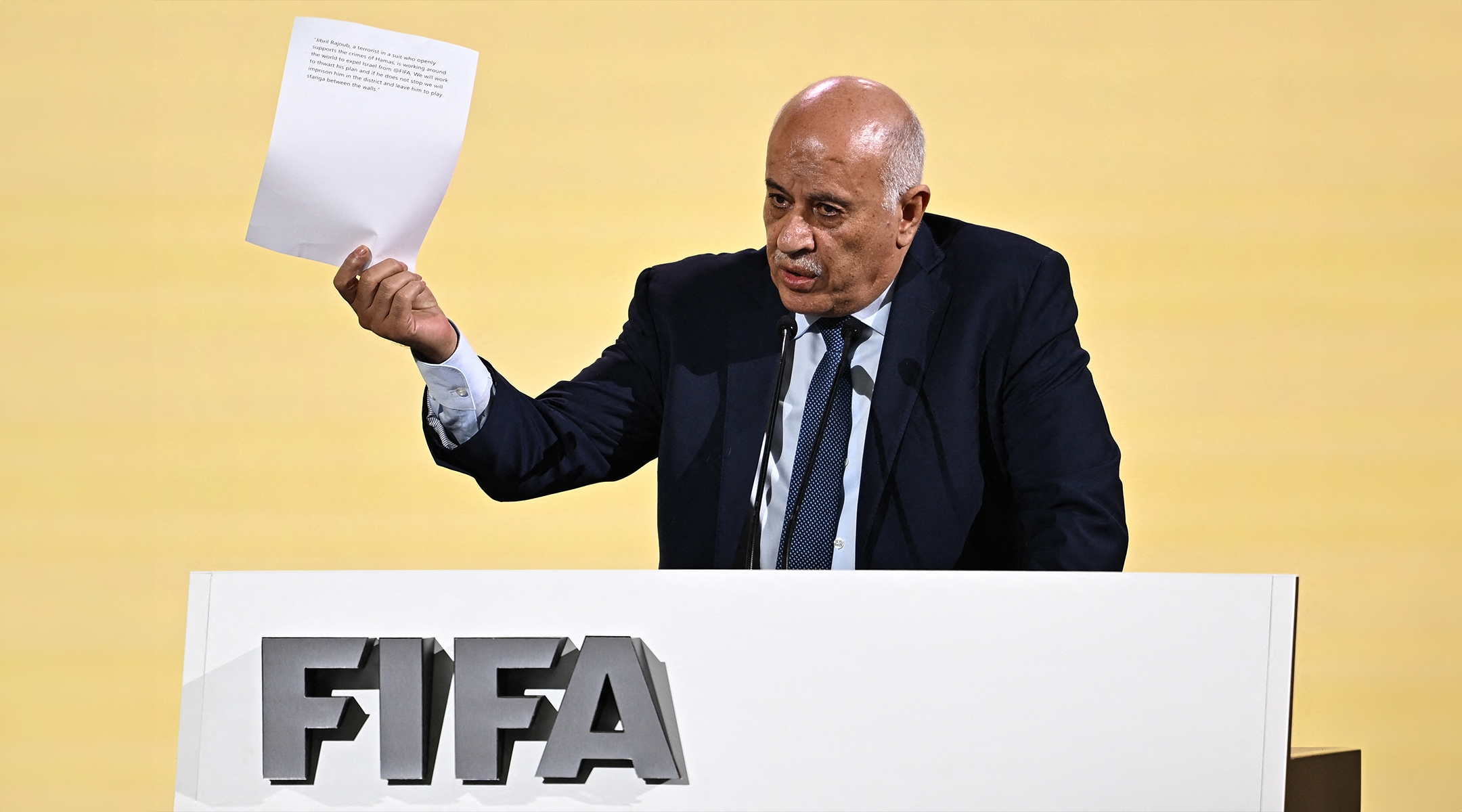FIFA is considering Palestinian request to bar Israel from international soccer competition
The governing body of international football is weighing a call issued by the Palestinian Football Association in March

Palestinian Football Association President Jibril Rajoub speaks during the 74th FIFA Congress, May 17, 2024, in Bangkok. (Manan Vatsyayana/AFP via Getty Images)
(JTA) — In July, Israel’s national soccer team returned to the Olympics for the first time in nearly 50 years. Now, the country is facing a potential ban from international competition in the world’s most popular sport.
FIFA, the global soccer governing body, is considering a request by the Palestinian Football Association (PFA) to temporarily bar the Israel Football Association (IFA) from future tournaments. The reason, as in Palestinian appeals to other international bodies, is the war in Gaza: Palestinian officials allege that Israel is committing violations of international law and running afoul of FIFA’s human rights policies.
The PFA submitted its official proposal in March, and a decision is now expected in October. FIFA has postponed the ruling multiple times, including days before the Olympics — a tournament in which the Palestinians also challenged Israel’s participation — and again ahead of its planned Aug. 31 announcement. FIFA sought independent legal review and solicited input from both the Israeli and Palestinian soccer federations.
“FIFA has received the independent legal assessment of the Palestine Football Association’s proposals against the Israel Football Association,” FIFA said in a statement on X. “This assessment will be sent to the FIFA Council to review in order that the subject can be discussed at its next meeting, which will take place in October.”
Israel has denied the accusations in the PFA’s claim, which IFA chief Moshe Zuares called a “cynical, political and hostile attempt by the Palestinian Association to harm Israeli football.”
Zuares said during remarks at FIFA’s annual congress in Bangkok in May, “Make no mistake, the IFA never violated rules set by FIFA and UEFA and will never do so in the future.”
Neither FIFA nor the IFA responded to Jewish Telegraphic Agency inquiries.
A ban would have an immediate effect on Israel’s national team, which is set to compete in the upcoming Nations League tournament organized by the Union of European Football Associations (UEFA), the European division of FIFA, of which Israel is a member. Israel plays its first tournament match against Belgium Sept. 6 in a game that has already been mired in controversy, as Belgium refused to host the match, citing security concerns. The game will instead be played in Debrecen, Hungary. The tournament’s initial phase extends into November, and the playoffs continue through June 2025, meaning Israel’s participation could be interrupted should it advance.
Depending on the duration of a possible ban, Israel could also be excluded from the qualifying tournament for the 2026 FIFA World Cup, which begins in March, and from other future European and global tournaments. Last summer, Israel finished third at the 2023 Under-20 World Cup and reached the semifinal in the UEFA European U-21 Championship.
Israel has belonged to UEFA since 1994, joining the European conference 20 years after it was kicked out of the Asian Football Confederation in a push spearheaded by its Arab neighbors. The Asian conference — along with soccer federations from Algeria, Jordan, Syria and Yemen — have all thrown their support behind the PFA’s effort to oust Israel.
“FIFA cannot afford to remain indifferent to these violations or to the ongoing genocide in Palestine, just as it did not remain indifferent to numerous precedents,” PFA President Jibril Rajoub said, according to Reuters.
Rajoub also said in May that 193 Palestinian soccer players had been killed in the Israel-Hamas war and pointed to other disruptions to Palestinian soccer as a result of the ongoing conflict.
In addition, Max du Plessis, an attorney who represented South Africa in its case accusing Israel of genocide at the International Court of Jucistice, co-wrote a legal analysis in support of a ban. The analysis argued, “Israel’s conduct demands censure, in line with the position adopted by FIFA in relation to similar egregious violations of its objectives and internationally recognised human rights.”
FIFA has a history of banning countries from competition for both geopolitical reasons and over interference or misconduct related specifically to soccer governance. Most notably, FIFA banned Russia from international competition just days after its 2022 invasion of Ukraine, and South Africa was banned for more than 20 years over its apartheid policies.
The PFA had also called for a vote to ban Israel from FIFA in 2015 over alleged discrimination against Palestinian players, but it ultimately dropped the bid.
“Like everyone, I was extremely, extremely shocked by what happened on Oct. 7 in Israel,” FIFA President Gianni Infantino said at the group’s convening in May. “And like anyone else, I was extremely, extremely shocked, and am extremely shocked at what’s happening in Gaza.”
Infantino added, “I pray for all those people who suffer the unimaginable … and I want, like all of you, just one thing: peace.”
A message from our CEO & publisher Rachel Fishman Feddersen
I hope you appreciated this article. Before you go, I’d like to ask you to please support the Forward’s award-winning, nonprofit journalism during this critical time.
We’ve set a goal to raise $260,000 by December 31. That’s an ambitious goal, but one that will give us the resources we need to invest in the high quality news, opinion, analysis and cultural coverage that isn’t available anywhere else.
If you feel inspired to make an impact, now is the time to give something back. Join us as a member at your most generous level.
— Rachel Fishman Feddersen, Publisher and CEO